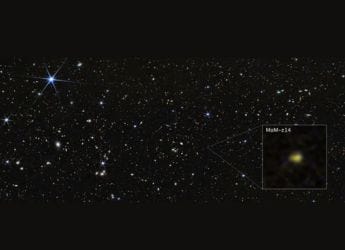- Home
- Science
- Science News
- Cosmic Visitor: 4.56 Billion Year Old Meteorite Strikes into Georgia Home
Cosmic Visitor: 4.56-Billion-Year-Old Meteorite Strikes into Georgia Home
A 4.56-billion-year-old meteorite from the asteroid belt tore through a Georgia home after a daylight fireball, offering scientists rare clues to the early solar system.

Photo Credit: University of Georgia
Bright meteor streaked Georgia sky June 26, 2025, rare daylight fireball event
A meteor burned through the Georgia sky in the middle of the day on June 26, 2025. The fireball was also so bright that both satellites and dozens of eyewitnesses in southeastern states caught it as well. A piece from the falling wreckage actually did make it through the blazing trip again to smash by way of a roof in McDonough, and dent a wood floor 14 feet down. Subsequent analysis by scientists at the University of Georgia looked at about 23 grams of these fragments, which dated at around 4.56 billion years old, just a smidge older than the Earth itself by as much as 20 million years. The rock, known as the McDonough Meteorite, is a low-metal ordinary chondrite — one of the oldest rock types in the entire solar system.
Origin
According to the team of researchers at University of Georgia led by geologist Scott Harris , the rock is a rare L-type ordinary chondrite — an ancient asteroid shard formed about 4.56 billion years ago. In other words, it solidified tens of millions of years before the Earth formed. Harris and colleagues traced its lineage to the main asteroid belt between Mars and Jupiter, likely released by a massive collision some 470 million years ago.
The team has submitted its findings to the Meteoritical Society's naming committee and proposed the name “McDonough Meteorite” for this specimen. Scientists note that studying such primordial space rocks offers clues about the early solar system and helps refine our understanding of asteroid impact risks.
Daylight Fireball
According to NASA, the object exploded over northern Georgia with a thunderous boom. It triggered sensors and got registered on weather-mapper satellite systems. In midday June, observers across Georgia, South Carolina and beyond saw a brilliant daylit fireball. The surviving chunk plummeted into a McDonough house like a high-speed projectile. It tore a hole in the ceiling and shattered the floor roughly 4 meters beneath, echoing through the neighbourhood. Residents reported hearing sonic booms and seeing a streak of light as the piece of space debris slammed into the home.
Get your daily dose of tech news, reviews, and insights, in under 80 characters on Gadgets 360 Turbo. Connect with fellow tech lovers on our Forum. Follow us on X, Facebook, WhatsApp, Threads and Google News for instant updates. Catch all the action on our YouTube channel.
- Samsung Galaxy Unpacked 2025
- ChatGPT
- Redmi Note 14 Pro+
- iPhone 16
- Apple Vision Pro
- Oneplus 12
- OnePlus Nord CE 3 Lite 5G
- iPhone 13
- Xiaomi 14 Pro
- Oppo Find N3
- Tecno Spark Go (2023)
- Realme V30
- Best Phones Under 25000
- Samsung Galaxy S24 Series
- Cryptocurrency
- iQoo 12
- Samsung Galaxy S24 Ultra
- Giottus
- Samsung Galaxy Z Flip 5
- Apple 'Scary Fast'
- Housefull 5
- GoPro Hero 12 Black Review
- Invincible Season 2
- JioGlass
- HD Ready TV
- Laptop Under 50000
- Smartwatch Under 10000
- Latest Mobile Phones
- Compare Phones
- iQOO 15 Ultra
- OPPO A6v 5G
- OPPO A6i+ 5G
- Realme 16 5G
- Redmi Turbo 5
- Redmi Turbo 5 Max
- Moto G77
- Moto G67
- Asus Vivobook 16
- Asus Vivobook S16 (2026)
- Black Shark Gaming Tablet
- Lenovo Idea Tab Plus
- HMD Watch P1
- HMD Watch X1
- Haier H5E Series
- Acerpure Nitro Z Series 100-inch QLED TV
- Asus ROG Ally
- Nintendo Switch Lite
- Haier 1.6 Ton 5 Star Inverter Split AC (HSU19G-MZAID5BN-INV)
- Haier 1.6 Ton 5 Star Inverter Split AC (HSU19G-MZAIM5BN-INV)












